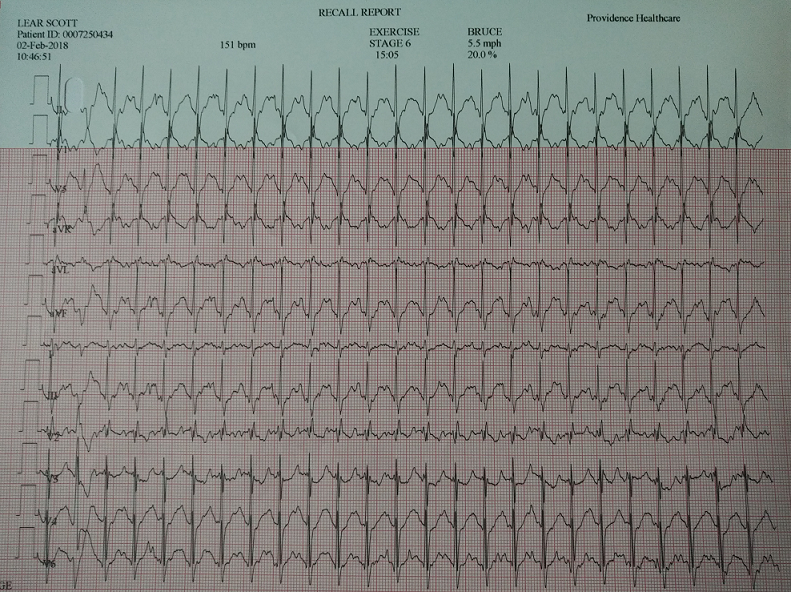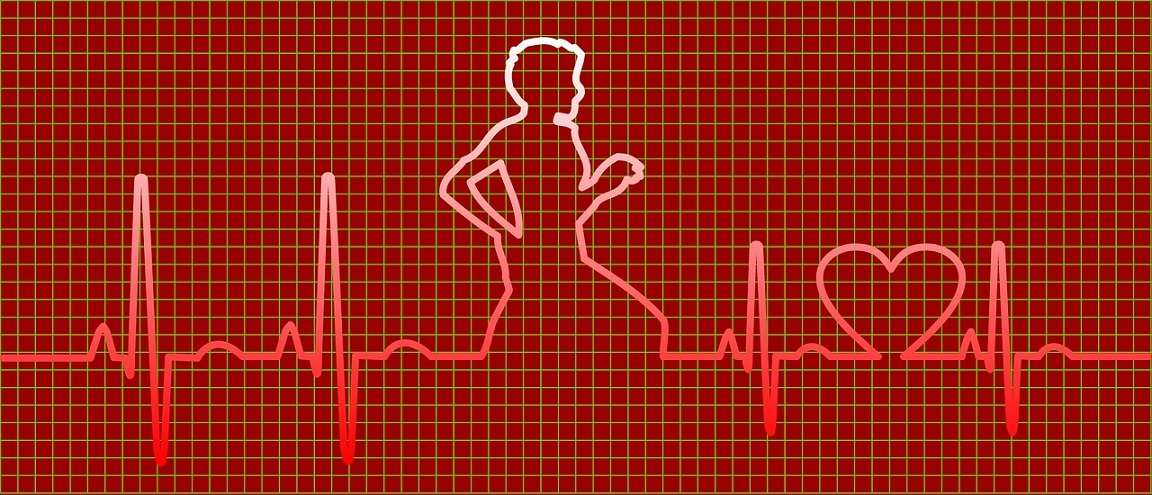It’s done! I completed my stress test and I was more than happy to get it over with.
Prior to the test, my mind was swirling with questions. Will I be able to last as long? How will taking my beta blocker affect my total time and performance? Last year, 15 minutes into the test, my heart rate went up to 255 beats for 10 seconds. Would my heart jump up to that speed again? Would things be worse? Or would the beta blocker work to prevent the palpitations allowing me to continue to perform at a high level?
Really, I shouldn’t have expected to go as long on the test as I did last year. I’m a year older and now taking a beta blocker. A beta blocker (in my case bisoprolol) lowers the strain, or work, of your heart by reducing your heart rate, and in the one I take, it also lowers blood pressure. By lowering the blood pressure the heart has less resistance to pump the blood out against and doesn’t have to work as hard. While mainly prescribed to reduce high blood pressure, mine was prescribed to help prevent the palpitations (arrhythmia) I was getting during exercise

To be honest, when I was getting all my tests done last year and the cardiologists prescribed the beta blocker, I was reluctant to start it. As a researcher working with patients I heard about the many unsettling side effects. Since beta blockers reduce the amount of adrenaline in the body, it can also lead to cold hands and feet, lowered sex drive, headaches and general feelings of fatigue.
The other side effect that I was concerned about was how it would affect my exercise. Since the beta blocker suppresses heart rate it can reduce heart rate elevation during exercise, resulting in a lower maximal ability for exercise. I was told by my cardiologist and my physician friends that my training and racing times would go down.
Of course I recognized the irony of hesitating to take my beta blocker while encouraging other patients to keep up with their medications. So I did start it and I’ve been taking it religiously ever since. It’s worked in stopping my palpitations while exercising, which is a big incentive for me to keep taking it. I haven’t really noticed any decrease in my performance while swimming, or other side effects. It does take me longer to warm up than before but I also feel I can train harder as I no longer have the worry of the palpitations occurring, giving me peace of mind.
Once I finally started the test, many of these questions faded into the background. That’s the good thing about exercise and how it helps refresh the mind. For the first three stages it went from a slow to a moderate walking speed. By the fourth stage (9 minutes in) the work started to kick in. I was walking briskly trying to avoid running (walking is more efficient than running so one should walk as long as possible on these tests). As each three-minute stage ended, the test technician asked me if I wanted to continue. Just before the 15 minute mark (start of the 6th stage) I told him about the arrhythmia from last year but I was okay to continue. The 6th stage started at a speed of 5 mph and 18% grade. I had to immediately start running. I kept glancing over at the ECG screen beside the treadmill to catch a glimpse of my heart rhythm. Everything looked okay. So far so good.

As the stage went on, fatigue set in. Sweat was dripping onto the electrodes, floor, everywhere. The slap of my feet on the treadmill was getting louder (note to self: don’t wear hiking shoes next time). Things were going well and I told the technician I’ve never completed the 6th stage and I wanted to try it. By this time my heart rate was in the mid-160s. My blood pressure response was fine. Once the time hit 17:30, my time from last year, I was in uncharted territory for me. I had never gone this far, this gave me a boost of confidence and I was determined to continue to the next stage.
Stage 7 started as the treadmill increased to 6 mph and 22% grade; so steep that I was hanging off the front railing as if climbing a mountain. My calves ached as did the front of my shins. My legs started to feel like jelly. Through gasps of breaths, I told the technician to get ready to stop. After 30 seconds into the stage the test stopped. The treadmill quickly powered down and I was moved to the bed beside the treadmill. No slow walking on the treadmill to cool-down as they want to see how your heart does immediately after the test.
After three and a half minutes, and two hospital towels drenched in sweat, my heart rate went down to 100 beats per minute and they let me go. I could feel my legs tighten up and wobble when I stood up. Now came the painful part; ripping off the electrodes. Despite being shaved before, it still hurt, and there were 12 of them.
The first few steps from the bed were hard, as if I just finished a marathon. I felt better after a shower, but soon a wave of fatigue hit me that continued all day. I was surprised at how drained I was and all I wanted to do was lie down and sleep. For the next few days my legs still felt sore.
A few hours later the supervising cardiologist at the test came and told me things looked pretty good. He mentioned there were some accelerated beats right at the end of the test up to 235 beats per minute (supraventricular tachycardia). He said my cardiologist will go over it with me but he didn’t think there was anything to worry about since it happened right at the end.
My time, 18:35. Better than last year, but I think this is more stubbornness than my being in better shape. Until next year…

If you like this post, don’t forget to subscribe to my blog at the bottom of the page.
Enjoy listening to podcasts? Check out my show How to Health. A podcast about you and your health.


Leave a Reply